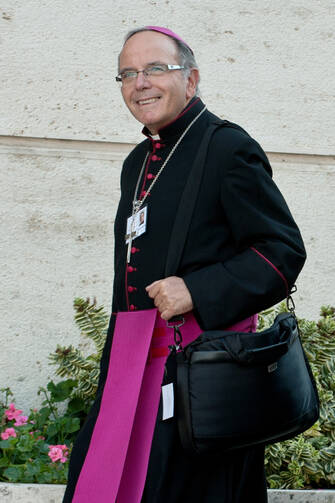Each year Portugal’s leading newspaper, Expresso, hands out the Pessoa Prize—“the Person”—to a figure in Portuguese society who has contributed most to the culture. It’s the nation’s most important cultural award. Its recipients are writers, artists, musicians, physicists, architects. And, as of 2009, priests: Manuel José Macário do Jesus Clemente, 66, then Bishop of Oporto in the North of Portugal, now the Patriarch of Lisbon (and as of Saturday a Cardinal), won the Person for his work as a historian and his civic involvement. The jury praised his “humanistic stance in favor of dialogue and tolerance,” and called him “an ethical reference for all of Portuguese society."
His episcopal motto In Lumine Tuo, “In Your Light,” Dom Manuel has made a career of shedding light on the relationship between faith and culture in Portugal. A PhD in Historical Theology, he is the author of dozens of books and articles and a well regarded professor. He’s also been very involved in social communications. He was the first Portuguese bishop to ever use YouTube for his Christmas message. He’s served as the President of the Portuguese bishops’ Episcopal Commission of Culture and Communications from 2005-2011 and as of 2011 is on the Pontifical Council for Social Communications.
In 2010 after the dominoes from the Greek economic crisis left Portugal also unable to pay its debts, Dom Manuel called on the church to show charity toward the many in need. God is “waiting for us in the poverty of others,” he said in his 2013 Christmas homily.
He showed an equal willingness to challenge the state—saying the levels of unemployment were far greater than being reported—and people rioting, saying violence “merely undermines and weakens every cause and never resolves any issues.”
The diocese of Lisbon dates back from the 4th century. Lisbon itself, known as “The White City” for the way its soft sunshine makes the buildings glow, is one of the oldest cities in the world, and the oldest in Western Europe, older than Rome by four hundred years. The country is over 80 percent Catholic (and the Patriarchate the same); but on average only 20 percent attend Mass regularly.
How do you feel about being named cardinal?
I feel the natural openness of a person who has been saying “yes” for so many years, with a deeper understanding of my own frailty and the power of God's grace. I believe there is no other way to dwell in peace.
What do you hope for the church today?
What the church expects of us all: that we may serve God by reaching out to real people who come to us for help or that we seek to help, for there is no other way to encounter God. Pope Francis is extremely captivating in this regard, with his attentive care to all and everyone, a beautiful picture of Christ the Shepherd.
What is one message you feel the church should be offering to today’s world?
The Gospel as it is, its words and spirit, without gloss or hesitations.
What are the most pressing issues facing your region and community?
In Lisbon seem to converge all of Portugal’s challenges: many families cannot meet their daily needs; there is a lack of job opportunities, and the unemployment rate is up to 13 percent. The elderly are left alone, and there is a lack of support and mentoring for young adults.
There are some improvements, that is a fact, but they cannot overshadow the long way we have to go towards a more supportive and creative country.
What has your region and your community taught you about God and the church?
That the less alienating and safer way to learn who God is is to live as a community, in church and in society, because God is “community”, continuously leading us out of ourselves and reaching out to others.
What’s an image of God, passage from Scripture or figure from church history that you look to for support and encouragement?
Jesus, on a boat, facing a windstorm, peaceful and able to continue through that challenge.
Finally: What are your hopes for next October’s Synod?
The clarification and support of the Christian family as the cornerstone of Christian community, a family of families, and yeast of a more familiar society as well.
That the expected focus on challenging situations, which will increase for sure, will not overshadow the beauty and truth of the Christian proposal.
Return to New Cardinals








